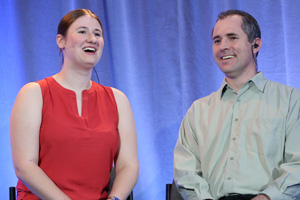Workshop Shows How to Make Open Science an Everyday Practice
 How can we carry out research that is credible and useful in solving social problems? What are the interventions, tools, and techniques that will improve the daily practice of psychological science? These are the questions that motivate researcher Brian Nosek, Courtney Soderberg, and the rest of the team at the Center for Open Science (COS) in Charlottesville, Virginia.
How can we carry out research that is credible and useful in solving social problems? What are the interventions, tools, and techniques that will improve the daily practice of psychological science? These are the questions that motivate researcher Brian Nosek, Courtney Soderberg, and the rest of the team at the Center for Open Science (COS) in Charlottesville, Virginia.
In their workshop at the 2016 APS Annual Convention in Chicago, Nosek (Executive Director of COS and professor of psychology at the University of Virginia) and Soderberg (statistical consultant at COS) highlighted the practical strategies and tools that scientists can use to conduct research in a way that fosters openness, integrity, and reproducibility.
A major roadblock to open research, they pointed out, is simple human fallibility. It can be all too easy to forget where you saved the latest version of your analyses. Having to integrate work across various collaborators and platforms only complicates matters further.
“Workflows are very personal,” said Nosek. “We each have ad hoc own systems for managing materials.”
One way to get around these issues? Put the hard work in at the very beginning, said Soderberg.
“The research workflow is very long and distributed,” she explained. “We need to structure our research space before we get started.”
Soderberg led workshop participants through an interactive demonstration, showing them how they could use the Open Science Framework (OSF) to streamline their workflow and document their progress as they work toward answering empirical questions. Participants learned how they could use the OSF platform to store their materials and their data, detail their analysis plans, and make the project accessible and discoverable to other researchers.
Look for a video of this workshop on the APS website later this year.




APS regularly opens certain online articles for discussion on our website. Effective February 2021, you must be a logged-in APS member to post comments. By posting a comment, you agree to our Community Guidelines and the display of your profile information, including your name and affiliation. Any opinions, findings, conclusions, or recommendations present in article comments are those of the writers and do not necessarily reflect the views of APS or the article’s author. For more information, please see our Community Guidelines.
Please login with your APS account to comment.